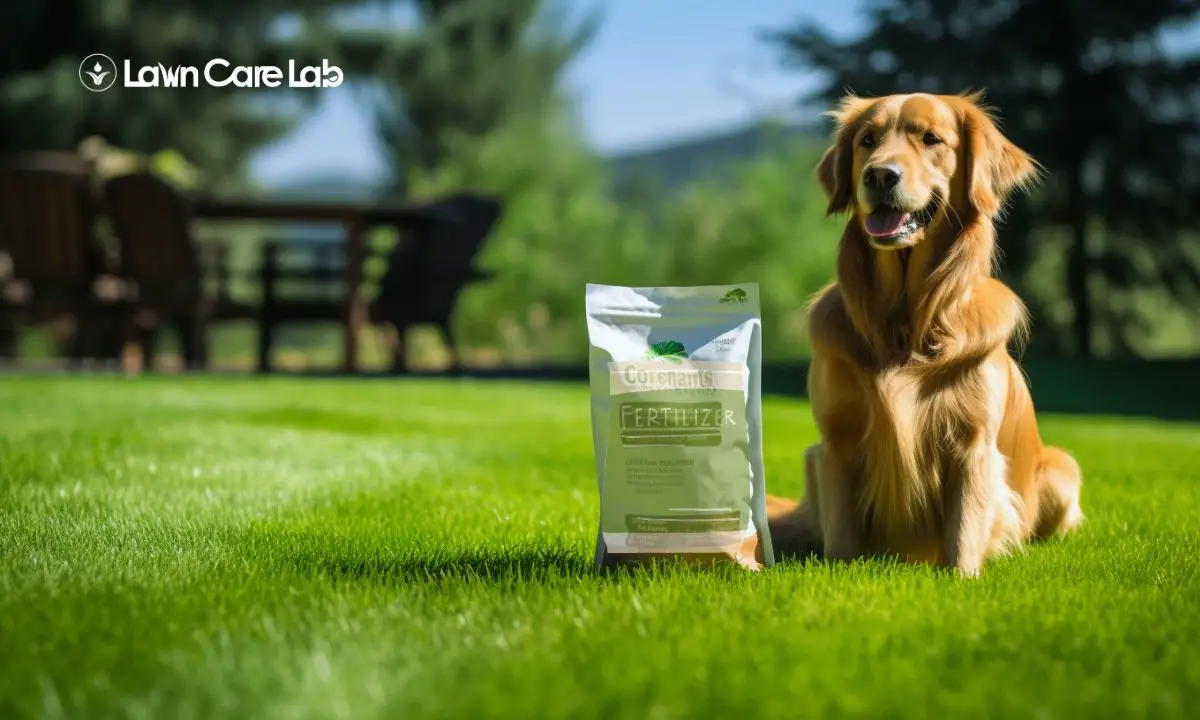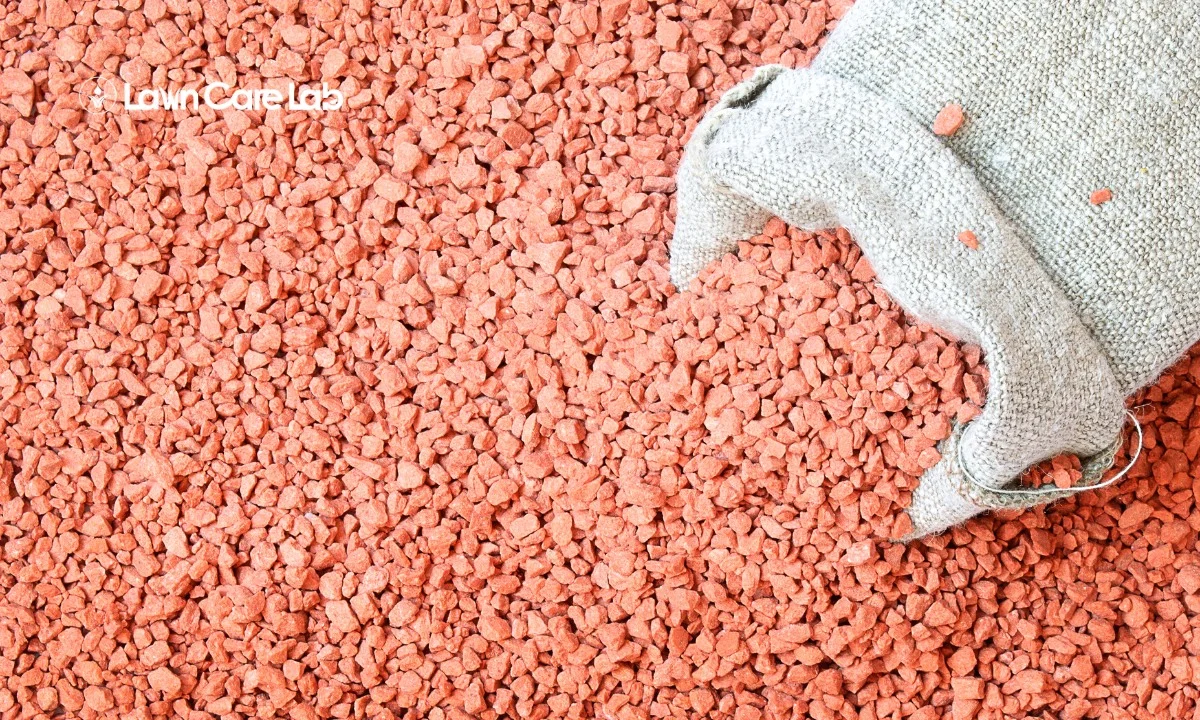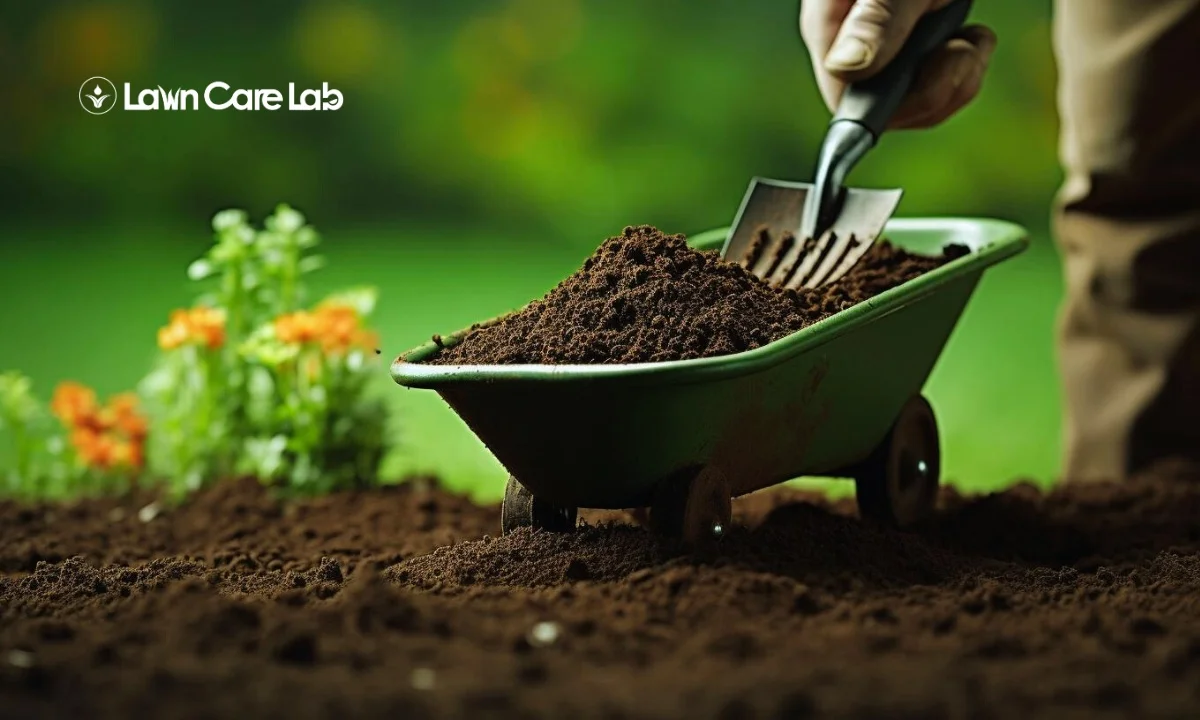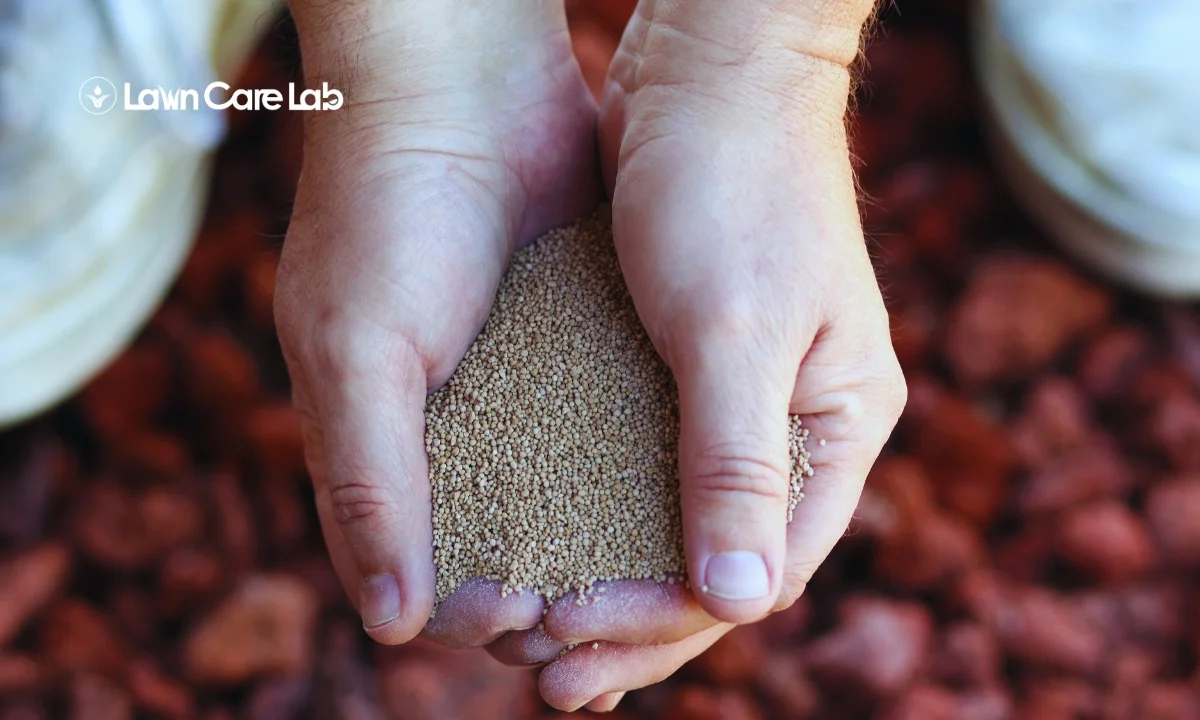Maintaining a beautiful lawn while being a responsible dog owner can be challenging, but there are ways to prioritize both.
This guide will provide insight into dog-friendly lawn fertilizers, equipping you with knowledge about what’s safe, efficient, and ideal for your green oasis and your canine companion.
Table of Contents
Understanding the Basics of Dog-Friendly Lawn Fertilizers
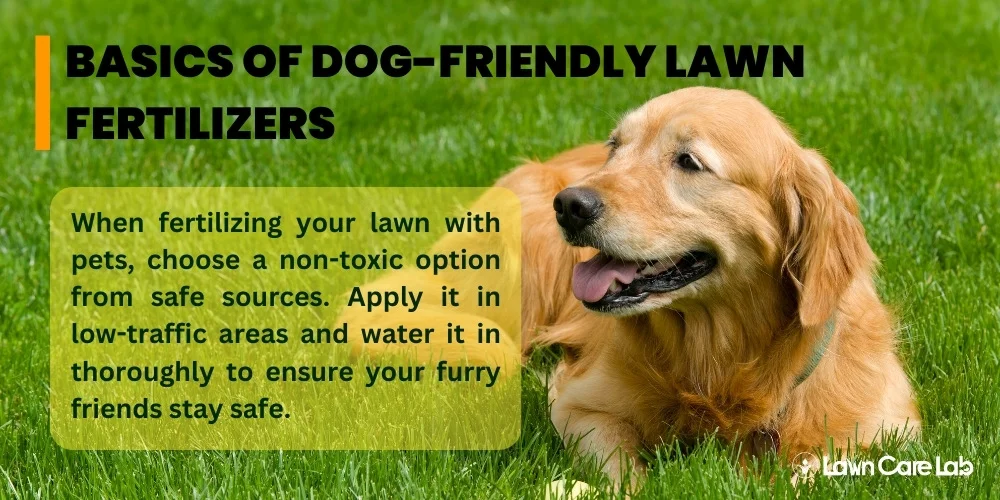
To maintain a perfect lawn, it is important to understand the basics of fertilizer and how it can affect dogs.
This is about maintaining a verdant expanse and safeguarding the well-being of your canine companions.
The intersection of lawn care and pet safety
Maintaining a verdant lawn while ensuring your pet’s safety can be delicate. However, it is possible and essential to establish an equilibrium where both your garden and pet can flourish.
We are about to explore the realm of dog-friendly lawn fertilizers, considering their components, their effectiveness, and any potential disadvantages they may present.
Lawn fertilizer safe for dogs: A closer look
Certain fertilizers are intentionally designed to be safe for pets, but their safety level can vary depending on the specific constituents.
The level of efficacy can differ significantly between products. Possible disadvantages might encompass a steeper price.
Let’s examine whether organic fertilizers are safe for our furry friends.
Is Organic Fertilizer Safe for Dogs?
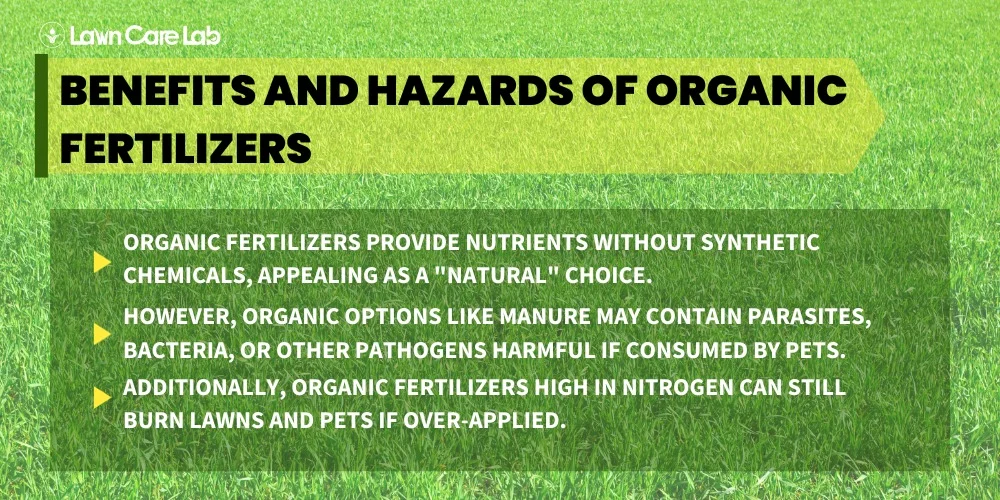
Even though they’re typically less harmful than synthetic variants, they aren’t completely devoid of danger.
The benefits and potential hazards of organic fertilizers
Organic fertilizers are popular for their eco-friendliness and steady nutrient supply but can pose risks. Manure can contain E. coli, and bone meal made from sick cattle can spread disease. High nitrogen levels can harm lawns and pets, so handle them with care for safety.
However, their use may not be entirely harmless, particularly for your canine companions.
Case study: Dog-friendly grass fertilizer
Here are the salient features of this product that are making it a hit among pet owners:
- Safe and non-poisonous for dogs
- Encourages the growth of vibrant, green grass
- The application process is straightforward.
- The formula is swift and effective.
- Offers value for money
It’s crucial to remember that our goal isn’t merely a verdant lawn but one that’s also a haven for your cherished pets.
Now, we shall transition to ‘nurturing your lawn with your dog’s safety in mind.’
Fertilizing Your Lawn with Dogs in Mind
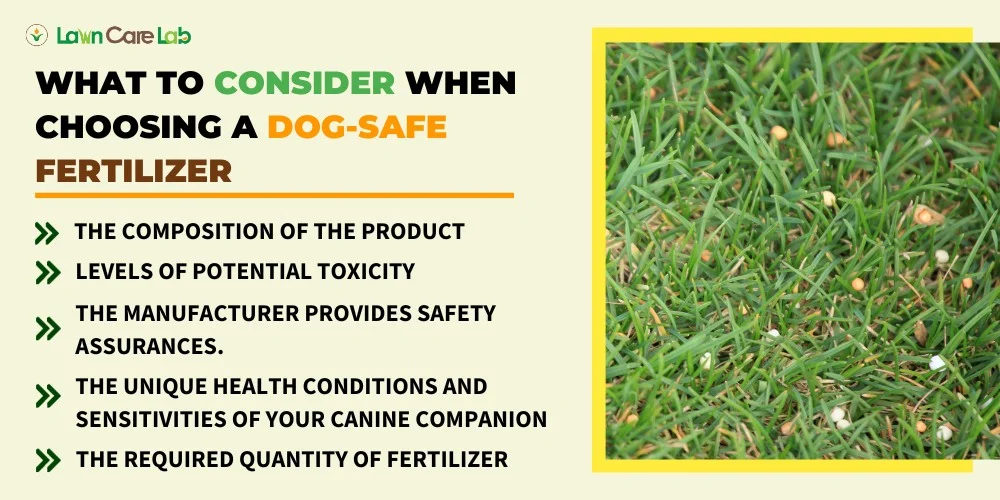
This comprehensive, step-by-step tutorial will enable you to effectively nourish your lawn without compromising the well-being of your cherished pet.
How to fertilize lawn with dogs
Lawn care with dogs can be tricky, but it’s manageable with the right tools and knowledge. This guide will help you fertilize your lawn safely and effectively.
What to consider when choosing a dog-safe fertilizer
In selecting a dog-friendly fertilizer, it’s imperative to give attention to certain key factors:
- The composition of the product
- Levels of potential toxicity
- The manufacturer provides safety assurances.
- The unique health conditions and sensitivities of your canine companion
- The required quantity of fertilizer
By considering these aspects, you can ensure you’re opting for a product that’s both effective and harmless for your dog.
Types of Fertilizers and Their Safety for Dogs
While certain fertilizers might be harmless, some could present serious health risks to your dog.
It’s essential to discern the safe from the hazardous, ensuring not only a flourishing lawn but also the well-being of your beloved pet.
Is starter fertilizer safe for dogs?
Starter fertilizers are great for root growth, but high nutrient levels can harm pets. Cheaper blends may contain toxic weed killers and pesticides. Use organic options in low-traffic areas, water well, and keep dogs off until dry. Safe use can promote healthy growth without harming pets.
Exploring granular lawn fertilizer
Consider the safety of granular lawn fertilizer for your dog based on several factors:
- The specific brand and its chemical composition.
- The size, age, and health condition of your dog.
- The time elapsed since the fertilizer was applied.
- Whether your dog consumes or breathes in the substance.
- The degree of your dog’s exposure to the fertilizer.
For safety, choose fertilizers labeled as safe for pets and follow their usage guidelines.
Safe Fertilization Practices for Dog Owners
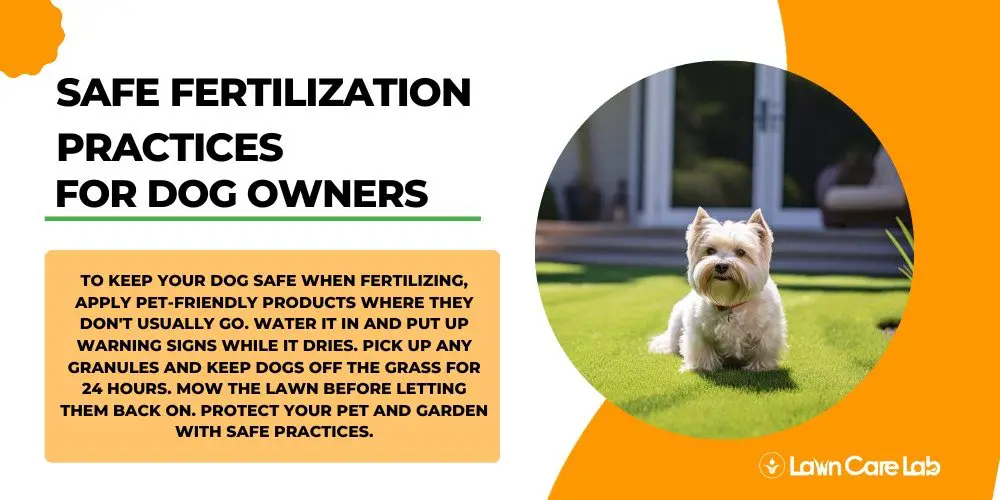
Choosing pet-friendly fertilizers for a safe and beautiful lawn can be tricky for dog owners.
To keep your dog safe when fertilizing, apply pet-friendly products where they don’t usually go. Water it in and put up warning signs while it dries. Pick up any granules and keep dogs off the grass for 24 hours. Mow the lawn before letting them back on. Protect your pet and garden with safe practices.
Follow these tips for safe fertilization to keep your pet healthy and your lawn lush.
Navigating the world of pet-safe fertilizers
Exploring the realm of pet-safe fertilizers is less complex than it appears. Armed with diligent research and informed choices, you can secure a product that safeguards your beloved pets while effectively nourishing your lawn.
Let’s examine an in-depth selection of amicable dog fertilizers to set you on the right path.
What fertilizer is safe for dogs: A comprehensive list
Embark on a journey through this comprehensive list of fertilizers, each meticulously selected for their safety around your cherished canine companion.
- Espoma Organic Lawn Food: This wholly natural, non-toxic option is ideal for your lawn.
- Scotts Natural Lawn Food: Offering a safe, chemical-free solution to lawn nourishment.
- Milorganite 0636 Organic Nitrogen Fertilizer: This product is eco-friendly, made from recycled material, and teeming with vital nutrients.
- Purely Organic Products Lawn Food: Free of manure, this product is an excellent choice for those with sensitive olfactory senses.
- EcoScraps for Organic Gardening: Predominantly plant-based, without any added fecal matter.
Each selection isn’t just safe for dogs but an effective method for fulfilling your lawn care requirements.
Balancing Lawn Care and Pet Safety
In conclusion, the quest for a verdant, thriving lawn can coexist harmoniously with your pet’s well-being. Let’s culminate with some final reflections on preserving this essential equilibrium between lawn care and pet safety.
Final thoughts on choosing a dog-friendly fertilizer
Numerous solutions exist that harmonize pet safety with proficient lawn care.
Consider these elements when choosing your fertilizer:
- Identify any components that may be hazardous to dogs.
- Favor slow-release fertilizers, which aren’t only safer but also more beneficial for your lawn.
- Contemplate organic alternatives, which generally are kinder to pets and positively impact the environment.
- It’s crucial to saturate your lawn thoroughly after applying fertilizer to minimize potential risks.
- Keep your canine companion away from the lawn until the fertilizer has been fully absorbed.
Remember that it’s your obligation to safeguard your four-legged friend’s health while maintaining a verdant and thriving yard.
Frequently Asked Questions
What Are Some Signs That My Dog May Have Ingested Harmful Fertilizer?
How Can I Train My Dog to Avoid Certain Areas of the Lawn After Fertilization?
Are There Specific Breeds of Dogs More Susceptible to Harmful Effects of Fertilizers?
What Is the Recovery Process Like if a Dog Ingests Harmful Fertilizers?
How Long Should I Wait After Fertilizing My Lawn Before Letting My Dog Out to Play on It?
- How to Create a Lawn Care Schedule for Southern Climates - October 30, 2024
- How to Use Compost Tea to Boost Lawn Growth and Soil Health - October 23, 2024
- The Best Grasses for Saltwater-Exposed Lawns: Coastal Lawn Care - October 17, 2024

